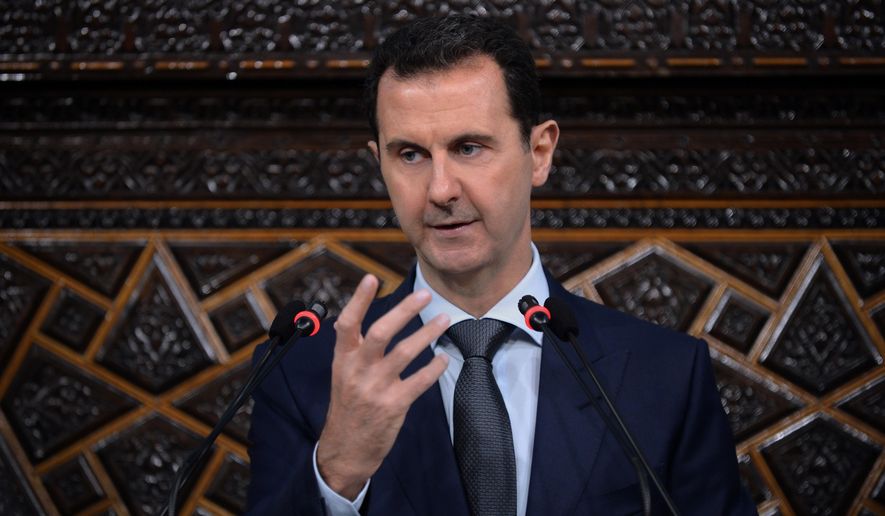The Obama administration has struggled to downplay the fallout from a leaked internal State Department cable signed by more than 50 midlevel diplomats slamming the White House’s Syria policy and calling for “targeted [U.S.] military strikes” against forces loyal to Syrian President Bashar Assad to boost embattled pro-U.S. rebel forces.
Secretary of State John F. Kerry said Friday that the unusually broad internal revolt, which became public last week, was important. But other administration officials made it clear that the memo is unlikely to change President Obama’s policy of avoiding a direct U.S. military confrontation with Mr. Assad to end Syria’s 5-year-old civil war.
White House spokeswoman Jennifer Friedman said the administration is “always open to new and different ideas when it comes to the challenges in Syria,” but she stressed that Mr. Obama simply “does not see a military solution to the crisis in Syria, and that remains the case.”
State Department spokesman John Kirby said Friday that officials “are obviously interested in looking at other views,” but “none of those other options are better than the one we’re pursuing.”
But news of the State Department cable has presented a fresh challenge to Mr. Obama’s hands-off approach to the crisis and has shown deep resistance to the president’s policy from the very officials tasked with implementing it.
The cable was sent through the so-called “dissent channel” at State, an established, albeit secretive, medium for Foreign Service officers to question U.S. policy. While dissent cables are not unusual — the channel dates back to the Vietnam War era — officials and analysts say the large number of diplomats who signed this one is extraordinary.
Fifty-one mostly career diplomats with experience in Middle Eastern affairs put their names on the cable, which was first reported Thursday night by The New York Times. The document urges the U.S. to carry out strikes against the Assad government to stop its persistent violations of a cease-fire negotiated by Washington and Moscow. It also warns that American policy has been “overwhelmed” by the unrelenting violence in Syria.
The cable marks the latest in a pattern of frustration emanating from current and former U.S. officials since 2013, when Mr. Obama made headlines with his assertion that the use of chemical weapons by the Assad regime would represent a “red line” that could trigger U.S. military retaliation.
The president later appeared to back off the threat in a favor of pursuing a peaceful political transition away from Mr. Assad in Syria. Some argue that such an approach indicates Washington is working tacitly with the Assad regime to battle the Islamic State group and other extremists in the war zone.
In his 2014 memoir, Leon E. Panetta, Mr. Obama’s former defense secretary, slammed the president’s indecisiveness toward U.S. military action against Mr. Assad’s forces after they reportedly used chemical weapons. The president “vacillated” over his Syria policy and “by failing to respond, it sent the wrong message to the world,” Mr. Panetta wrote.
Mr. Kerry and his predecessor under Mr. Obama, Hillary Clinton, have long been said to be frustrated by the president’s reluctance to authorize force in the Syrian conflict.
Mr. Kerry made his comments about the dissent cable Friday in an interview with Reuters. He said he had not read the cable but respected “the process, very, very much.”
Another critic has been the Obama administration’s former ambassador to Syria, Robert Ford. Months after resigning from the post in 2014, Mr. Ford publicly lamented that the administration had “consistently been behind the curve” on the conflict.
Now an analyst with the Washington-based Middle East Institute, Mr. Ford said in an interview Friday with Voice of America that the large number of diplomats who signed last week’s memo is significant.
“They are warning that the way that it is going now, it is never going to succeed and there needs to be, therefore, a change,” he said.
With that as a backdrop, administration critics on Capitol Hill are citing last week’s dissent cable to demand that the administration shift toward a more aggressive U.S. military posture against Mr. Assad.
“Even President Obama’s own State Department believes the administration’s Syria policy is failing,” House Foreign Affairs Committee Chairman Edward R. Royce, California Republican, said in a statement. “Iran, Russia and Assad call the shots in Syria, ignoring the cease-fire and allowing Assad to continue war crimes against his own people.”
Whether the cable will trigger any change in the president’s approach is doubtful.
“Obama’s Syria policy has been an exceedingly slow-motion train wreck,” said Peter Feaver, a professor of political science and public policy at Duke University who served as a national security adviser to President George W. Bush.
“The protest is noteworthy but not surprising. Nor is it likely to shift actual policy,” said Mr. Feaver. “President Obama has many strengths, but thoughtfully engaging his critics is not one of them.”
In highly cited foreign policy interviews with The Atlantic correspondent Jeffrey Goldberg, meanwhile, Mr. Obama has made it clear that he is more skeptical than even the “liberal interventionists” in his own administration — including Mrs. Clinton and Samantha Power, U.S. ambassador to the United Nations — about the potential effectiveness of U.S. military force in Syria.
“Syria, for Obama, represented a slope potentially as slippery as Iraq,” Mr. Goldberg wrote after interviewing the president early this year. “In his first term, he came to believe that only a handful of threats in the Middle East conceivably warranted direct U.S. military intervention,” including al Qaeda, threats to Israel and a nuclear-armed Iran.
“The danger to the United States posed by the Assad regime did not rise to the level of these challenges,” Mr. Goldberg wrote.
• Guy Taylor can be reached at gtaylor@washingtontimes.com.




Please read our comment policy before commenting.